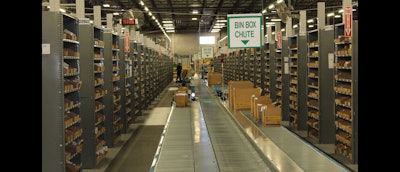
Three-quarters of warehouse professionals expect that their companies will add new locations, increase shipment volumes, and invest in new technologies over the next five years, according to a 2016 survey of over 1,378 warehouse professionals from 12 countries. While planning for this growth, many companies will naturally consider upgrading the WMS because of its high impact on customer service, warehouse productivity and inventory control. But when is the right time to switch? The simple answer is that you should upgrade to a new system if it offers the right improvements, can scale better, and brings enough benefits to justify the investment. This includes both the financial spend on the new system as well as the time required to train staff and implement new processes, plus any disruption that the implementation may cause your business during the transition.
Like a capital equipment investment, your company will pay the costs of a new WMS up front and enjoy the benefits spread out over many years. (Yes, I’m foregoing the lower startup cost model of cloud offerings and the reasons why this software model refuses to catch traction in the WMS space, as that is a whole different discussion in itself).
The improvements often seem less immediate than the large price tag and the prospect of company-wide retraining. So, let’s be more objective and point to some questions that will help you compare your current system against one from a new vendor. You may find that you need a better fit to support and scale with your business in the long run. I'll include some customer case examples from my company, PathGuide Technologies.
1. Is my current WMS holding back productivity? If so, how and in which areas of the warehouse? This will let you identify your weaknesses and tell you what features to look for in a new WMS. According to one of our customers, Alex Hirsch, the vice president of technology at HUB Industrial Supply in Florida: “One of the most important steps HUB took before deciding on a WMS vendor was to hone in on our requirements. These included…the ability to achieve greater efficiency, improve receiving and picking accuracy, and better employee accountability and time management in the warehouse.”
Defining a wish list of features like these ahead of time will limit your WMS search to a manageable level. Look for everything, including the kitchen sink, and your search can continue to spin with no end in sight.
2. Which WMS products will integrate with my ERP system? Most independent WMS providers now support the major ERPs, so if the WMS provided by your ERP vendor doesn’t have the depth or flexibility to do everything you need, it may be a good idea to consider other options. Check this up front to avoid wasting time investigating a WMS that won’t work with your ERP.

3. What kinds of advanced functions does the new WMS offer compared to your current system? Can the WMS integrate easily with vertical lifts, carousels and/or conveyor sorting systems? What kind of custom labeling or packing slip printing options does it offer? Does it support real-time paperless cycle counting and cycle count planning to improve inventory accuracy? Does it offer vendor managed inventory options or allow you to automatically schedule inbound freight? Compare these functions based on what your customers need, but also think about how you could attract new customers if your company were to upgrade its services.
4. Can the new WMS support the demands of e-commerce? The rise of e-commerce means that more and more single-order or less-than-pallet-sized orders are being shipped. If a WMS is not strong in this area, it could seriously hamper your ability to work with retail customers as this expectation continues to grow.
Jim Hart, senior vice president at Jensen Distribution Services, added: “E-commerce fulfillment has become an important driver for our business. Our program has expanded by 80 percent this year alone, and the accuracy of our system is key to continuing that growth.”
5. Which WMS can be more easily customized? Next, you should expect a certain level of tweaking to get your WMS to fit your company’s specific needs. How responsive are the vendors to these requests, and is there a charge for them? In general, a customizable WMS will give you better results than one that can’t be modified.
That was the case for Kyle Sutter, the VP of operations for Fisheries Supply in Seattle. His advice is simple: “To get the most value out of any software platform, you need to understand that it’s not a set-it-and-forget-it system. It’s always improving, and that’s a good thing.”
6. What level of support and training do the two vendors offer? Finally, small problems with a WMS are inevitable, so look for a vendor that is responsive and helpful. Do you have easy access to support staff as a customer, or are you stuck waiting in a queue for a representative at an international call center help desk? Also, a vendor that offers webinars, hands-on training, meet-ups and/or user conferences demonstrate a better long-term vision for their products that safeguards the investment in their customers. Ask the prospective WMS vendor how much experience the implementation team has, what implementations with past customers have been like, and if you can speak with some of those customers to get their honest opinion. This will give you a realistic idea of what to expect from the implementation process.
 Eric Allais, CEO of PathGuide Technologies
Eric Allais, CEO of PathGuide TechnologiesThese questions should give you a solid platform on which to compare the new WMS to your old one. Good luck in making your decision!
Eric Allais, president and CEO of Washington-based PathGuide Technologies, Inc., has over 30 years of experience in marketing, product management and sector analysis in the automated data collection industry, including warehouse management practices in wholesale distribution. He can be contacted at [email protected].























